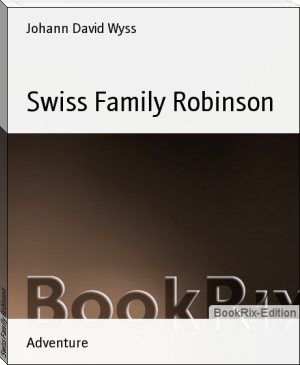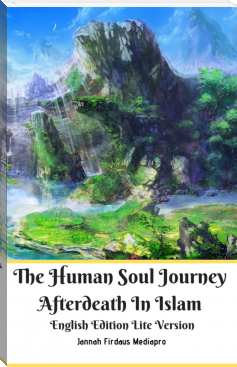Swiss Family Robinson - Johann David Wyss (poetry books to read txt) 📗

- Author: Johann David Wyss
- Performer: -
Book online «Swiss Family Robinson - Johann David Wyss (poetry books to read txt) 📗». Author Johann David Wyss
a look of disappointment upon his countenance.
`Unsuccessful!’ said he.
`Really!’ I replied. `Never mind, my boy, better luck next time.’
`Oh, Fritz!’ exclaimed his brothers who had looked behind him. `
A sucking-pig, a little sucking-pig. Where did you get it? How
did you shoot it? Do let us see it!’
Fritz then with sparkling eyes exhibited his prize.
`I am glad to see the result of your prowess, my boy,’ said I;
`but I cannot approve of deceit, even as a joke; stick to the
truth in jest and earnest.’
Fritz then told us how he had been to the other side of the stream.
`So different from this,’ he said, `it is really a beautiful
country, and the shore, which runs down to the sea in a gentle
slope, is covered with all sorts of useful things from the wreck.
Do let us go and collect them. And, father, why should we not
return to the wreck and bring off some of the animals? Just think
of what value the cow would be to us, and what a pity it would be
to lose her. Let us get her on shore, and we will move over the
stream, where she will have good pasturage, and we shall be in
the shade instead of on this desert, and, father, I do wish—’
`Stop, stop, my boy!’ cried I. `All will be done in good time.
Tomorrow and the day after will bring work of their own. And tell
me, did you see no traces of our shipmates?’
`Not a sign of them, either on land or sea, living or dead,’ he
replied.
`But the sucking-pig,’ said Jack, `where did you get it?’
`It was one of several,’ said Fritz, `which I found on the shore;
along with some very curious little animals that hopped rather
than walked, and every now and then would squat down on their hind
legs and rub their snouts with their forepaws. Had not I been
afraid of losing all, I would have tried to catch one alive,
they seemed so tame. But this was more easily taken.’
Meanwhile, Ernest had been carefully examining the animal
in question.
`This is no pig,’ he said, `and except for its bristly skin,
does not look like one. See, its teeth are not like those of a
pig, but rather those of a squirrel. In fact,’ he continued,
looking at Fritz, `your sucking-pig is an agouti.’
`Dear me,’ said Fritz, `listen to the great professor lecturing!
He is going to prove that a pig is not a pig!’
`You need not be so quick to laugh at your brother,’ said I, in
my turn, `he is quite right. I, too, know the agouti by descriptions
and pictures, and there is little doubt that this is a specimen.
The little animal makes its nest under the roots of trees, and
lives upon fruit. Its meat is white but dry, having no fat, and never
entirely loses a certain wild flavour, which is disagreeable
to Europeans. It is held in great esteem by the natives where
it lives, especially when the animal has been feeding near the
sea on plants impregnanted with salt. But, Ernest, the agouti
not only looks something like a pig, but most decidedly grunts
like a porker.’
While we were thus talking, Jack had been vainly endeavouring to
I, placing an oyster on the fire; it immediately opened.
`Now,’ I continued, `who will try this delicacy?’ All at first
hesitated to partake of them, so unattractive did they appear.
Jack, however, tightly closing his eyes and making a face as
though about to take medicine, gulped one down. We followed his
example, one after the other, each doing so rather to provide
himself with a spoon than with any hope of cultivating a taste
for oysters.
Our spoons were now ready, and gathering round the pot we dipped
them in, not, however, without sundry scalded fingers. Ernest
then drew from his pocket the large shell he had procured for
his own use, and scooping up a good quantity of soup he put it
down to cool, smiling at his own foresight.
`Prudence should be exercised for others, not just for oneself,’
I remarked. `Are you so much better than your brothers? Your cool
soup will do capitally for the dogs, my boy; take it to them, and
then come and eat like the rest of us.’
Ernest winced at this, but silently taking up his shell he placed
it on the ground before the hungry dogs, who lapped up its contents
in a moment; he then returned, and after waiting for the soup to
cool some more, we all went merrily on with our dinner.
While we were thus busily employed, we suddenly discovered that
our dogs, not satisfied with their mouthful of soup, had espied
the agouti, and were rapidly devouring it. The boys all began to
yell, and Fritz first threw a stone at the dogs and then, seizing
his gun, flew to rescue it from their hungry jaws. Before I could
prevent him, he struck one of them with such force that his gun w
as bent. The poor beasts ran off howling, followed by a shower of
stones from Fritz, who shouted and yelled at them so fiercely,
that if I had not interfered, it was probable he would have
killed them.
I followed him, and as soon as he would listen to me, represented
to him how despicable as well as wicked was such an outbreak of
temper. `For,’ said I, `you have hurt, if not actually wounded,
the dogs; you have distressed and frightened your mother, and
you have spoiled your gun, which would have been so useful.’
Though Fritz’s passion was easily aroused it never lasted long,
and speedily recovering himself, immediately he entreated his
mother’s pardon, and expressed his sorrow for his fault.
By this time the sun was sinking beneath the horizon, and the
poultry, which had been straying to some little distance, gathered
round us, and began to pick up the crumbs of biscuit which had
fallen during our repast. My wife hereupon drew from her mysterious
bag some handfuls of oats, peas, and other grain, and with them
began to feed the poultry.
She at the same time showed me several other seeds of various
vegetables. `That was indeed thoughtful,’ said I, `but pray be
careful of what will be of such value to us; we can bring plenty
of damaged biscuits from the wreck, which though of no use as
food for us, will suit the fowls very well indeed.’
The pigeons now flew up to crevices in the rocks, the fowls
perched themselves on our tent pole, and the ducks and geese
waddled off cackling and quacking to the marshy margin of the
river. We too were ready for repose, and having loaded our guns,
and offered up our prayers to God, thanking him for his many
mercies to us, we commended ourselves to his protecting care,
and as the last ray of light departed, closed our tent and lay
down to rest.
The children remarked the suddenness of nightfall, for indeed
there had been little or no twilight. This convinced me that we
must be not far from the equator, for twilight results from the
refraction of the sun’s rays; the more obliquely these rays fall,
the further does the partial light extend, while the more
perpendicularly they strike the earth the longer do they continue
their undiminished force, until when the sun sinks, they totally
disappear, thus producing sudden darkness.
We should have been badly off without the shelter of our tent,
for the night proved as cold as the day had been hot, but we
managed to sleep comfortably, every one being thoroughly fatigued
by the labours of the day.
The voice of our vigilant cock, which as he loudly saluted the
rising moon, was the last sound I heard at night, roused me at
daybreak, and I then awoke my wife, that in the quiet interval
while yet our children slept, we might take counsel together on
our situation and prospects. It was plain to both of us that in
the first place, we should ascertain if possible the fate of our
late companions, and then examine into the nature and resources
of the country on which we were stranded.
We therefore came to the resolution that, as soon as we had
breakfasted, Fritz and I should start on an expedition with
these objects in view, while my wife remained near our landing-place with the three younger boys.
`Rouse up, rouse up, my boys,’ cried I, awakening the children
cheerfully. `Come and help your mother to get breakfast ready.’
`As to that,’ said she, smiling, `we can but set on the pot, and
boil some more soup!’
`Why! You forget Jack’s fine lobster!’ replied I. `What has become
of it, Jack?’
`It has been safe in this hole in the rock all night, father. You
see, I thought as the dogs seem to like good things, they might
take a fancy to that as well as to the agouti.’
`A very sensible precaution,’ remarked I. `I believe even my
heedless Jack will learn wisdom in time. It is well the lobster
is so large, for we shall want to take part with us on our excursion
to-day.’
At the mention of an excursion, the four children were wild with
delight, and, capering around me, clapped their hands for joy.
`Steady there, steady!’ said I, `you cannot expect all to go.
Such an expedition as this would be too dangerous and fatiguing
for you younger ones, and this place seems perfectly safe. Fritz
and I will go alone this time, with one of the dogs, leaving the
other to defend you. Fritz, prepare the guns, and tie up Flora
so that she will not follow us.’
At the word ‘guns’ the poor boy blushed shamefully. He tried in
vain to straighten his weapon. I left him alone for a short time,
but at length I gave him leave to take another, perceiving with
pleasure that the vexation had produced a proper feeling in his mind.
A moment later he tried to lay hold of Flora to tie her up, but
the dog, recollecting the blows she had so lately received, began
to snarl and would not go near him. Turk behaved the same, and I
found it necessary to call with my own voice to induce them to
approach us. Fritz then, in tears, entreated some biscuit of his
mother, declaring that he would rather go without the rest of his
breakfast to make his peace with the dogs. He accordingly carried
them some biscuit, stroked and caressed them, and in every motion
seemed to ask their pardon. As of all animals, without excepting
man, the dog is least addicted to revenge, and at the same time
is the most sensible of kind usage, Flora instantly relented and
began to lick the hands which fed her; but Turk, who was of a
more fierce and independent temper, still held off, and seemed t
o lack confidence in Fritz’s advances.
`Give him a claw of my lobster,’ cried Jack, `for I meant to
give it to you anyway, for your journey.’
With that treat, Turk seemed ready to forgive Fritz. We then armed
ourselves, each taking a gun and a game-bag; Fritz, in addition,
sticking a pair of pistols in his belt, and I a small hatchet in
mine; breakfast being over, we stowed away the remainder of the
lobster and some biscuits, with a flask of water, and were





Comments (0)